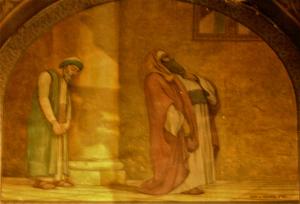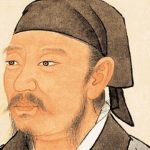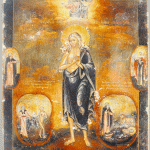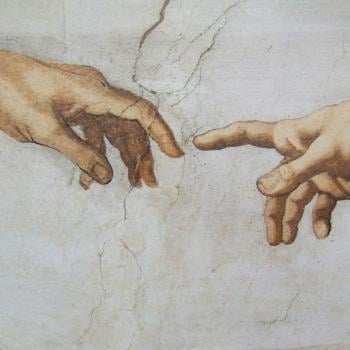
Preparing the faithful for the Great and Holy Fast (Great Lent), the Byzantine tradition gives us various Sundays with spiritual lessons and teachings which remind us of our need for grace. We are not to presume too much about ourselves based upon our spiritual disciplines. We learn this especially this week with the Sunday of the Publican and the Pharisees, a Sunday which reminds us that we should not become prideful, thinking we can and will be justified before God because of the good things which we have done. Instead, we must recognize that whatever good we have done, whatever good we have in us, comes from God, who is the source and foundation for every good. We must humbly acknowledge God’s role in our lives. We must accept that all justification comes from and through God. Of course, we have a role in that justification, for we must cooperate with God’s grace, but what is important is that we realize we cannot achieve it all by ourselves. We are limited in what we can do, and if we want to get beyond that limit, we must open ourselves to God’s grace, to allow it to penetrate us and transform us from within. On the other hand, if we become too self-absorbed, prideful of our accomplishments, we cut it off from our lives; then, we will not be able to be justified because we try to justify ourselves instead of receive such justification from God’s merciful grace. This how the Pharisee in the parable of the Publican and the Pharisee erred and why he was not able to be justified:
Two men went up into the temple to pray, one a Pharisee and the other a tax collector. The Pharisee stood and prayed thus with himself, `God, I thank thee that I am not like other men, extortioners, unjust, adulterers, or even like this tax collector. I fast twice a week, I give tithes of all that I get.’ But the tax collector, standing far off, would not even lift up his eyes to heaven, but beat his breast, saying, `God, be merciful to me a sinner!’ I tell you, this man went down to his house justified rather than the other; for every one who exalts himself will be humbled, but he who humbles himself will be exalted (Lk. 18:1-14 RSV).
When we let pride take over our soul, when we think too greatly of ourselves, it will show in the way we treat others. We will judge them based upon our own accomplishments. We will be glad we are not like them, that we have made something of ourselves, something worthwhile and praiseworthy which we believe should be acknowledged by all. Likewise, we will think that if someone does not measure up to us, there is something wrong with them, and we will end up being glad we are not like them. We will praise ourselves all the way to God while looking down upon others; we might not condemn them, but we will certainly think they are not worthy of any honor or respect. The Pharisee, fasting twice a week, giving even a little of the money which he had, thought he was better than others, proving he was spiritually poor: “The Pharisee was a poor man that is proud: poor, because he left an opening whereby thieves entered and stole all his goods; proud, because he got above himself when he thought himself better than others. A proud man is poor, because he lacks the riches of humility, the lack of which leaves one supremely wretched.” [1]
Humility is important. It is much more important than fasting. Fasting when used as a tool to make ourselves look greater than others does not follow the true spirit of the fast. Rather, it abuses the fast, ignoring the principle and intention of the fast itself. Fasting should help us realize our proper relationship with God and each other. Through fasting, we should discern more about ourselves and our potential, to see the limits of that potential, which then should have us reach out to God and to each other so that we can receive from God and others what we do not have from ourselves. Justification is possible with grace, but if we are so attached to ourselves we do not think we need anything from anyone we will deny grace, and without it, we cannot be justified, for without it, we will be far from the perfection needed for such justification. “The Pharisee suffered from this disease, and this is why he went down not justified, because he attributed his good qualities to himself alone, and looked down on the publican.”[2] It is humility which brings salvation, for it is humility which recognizes the need for grace, the need for external aid; if we are too prideful to ask for it, if we are so prideful that we think we do not need it, we will end up like the Pharisee, going out, thinking we are great as we are, and so as never looking for or receiving the justification which we need.
It is not going to be easy. We must be humble, and that means, we must sometimes accept that things will not go as we wish. We cannot place undue demands on God. We mut be open to God, open to God’s love, open to God’s grace. It will come, because it is already there; the potential has to be actualized with our cooperation with it. This is why the fast can be invaluable. It is a way for us to learn how to discipline ourselves so we can properly cooperate with God’s grace. It should help us overcome inordinate desires, but this is possible only if we keep the fast with a spirit of humility. If we try to prove ourselves superior to others by the way we fast, the fast is worthless, as we end up feasting on our pride, gorging ourselves with accolades, and becoming fat with smugness
The Publican shows us the spirit which we should possess, one of great humility, one which looks up to God and says, “Lord, have mercy!” We need mercy, and we will get it if we ourselves are merciful. We need love, and we will get it if we ourselves are loving. We need grace, and we will get it if we ourselves are graceful, always doing what we can to lift others up instead of pushing them down. Of course, most of us have a mix of the Publican and the Pharisee in us. We realize, to some degree, our need for mercy, and we get it insofar we act upon that need; but we also tend to be selfish, looking to lift ourselves up over others, and in doing so, we find ourselves falling off the path of righteousness, proving we truly are the ones who need such mercy. As we prepare for the fast, let us keep in mind the value of humility, and work to increase it in ourselves so that once we leave the world at the end of our lives we find ourselves justified with grace and receive the blessings of the kingdom of God.
[1] St. Anthony of Padua, Sermons for Sundays and Festivals. Volume II. trans. Paul Spilsbury (Padova: Edizioni Messaggero Padova, 2007), 275.
[2] St. Anthony of Padua, Sermons for Sundays and Festivals. Volume II, 273.
Stay in touch! Like A Little Bit of Nothing on Facebook.
If you liked what you read, please consider sharing it with your friends and family!












